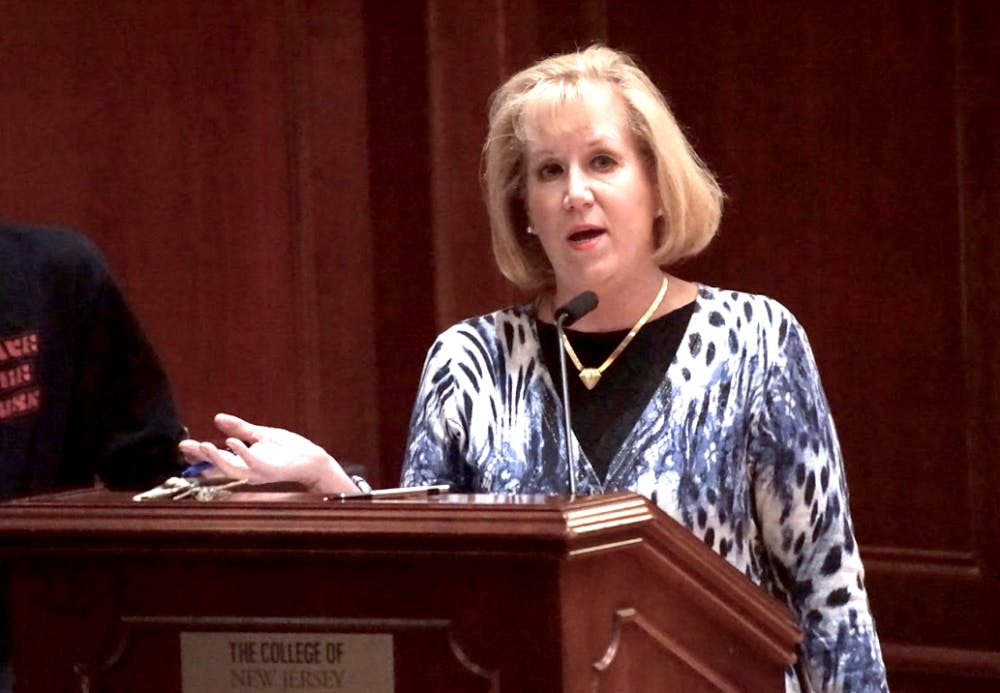By Alyssa Louis
Social Media Editor
The School of Arts and Communication continued its fall 2018 faculty lecture series with its fifth presentation titled, “Celebrity Culture and the Criminal Justice System” in Mayo Concert Hall on Oct. 19.
Emilie Lounsberry, a professor in the journalism and professional writing department, shared her experience covering the trial and sentencing of Bill Cosby for Variety magazine.

“How many of you grew up watching ‘The Cosby Show,’” Lounsberry asked the audience.
The hands of students and faculty alike were raised in the air, showing how Cosby has long since been become a household name because of both his celebrity status and the sexual assault accusations against him.
Variety was one of the first news organizations to have reported on the guilty verdict of the Cosby trial, according to Lounsberry.
Lounsberry showed a brief video that documented the life of Cosby from his time as a beloved television star to his downfall as the 81-year-old standing trial for the sexual assault of Andrea Constand in 2004.
The professor and award-winning journalist jumped at the opportunity to cover this trial during the pivotal “Me Too” movement, a campaign that shines light on sexual assault and harassment. According to Lounsberry, the movement served as the backdrop for the Hollywood icon’s fall from grace with protesters often gathered outside of the courthouse.
The influence of Cosby’s notoriety and the growing “Me Too” social media movement cast a shadow of potential biases from jurors, according to Lounsberry.
The jury could not come to a conclusive verdict for Cosby’s first trial, which soon ended in a mistrial.
The former entertainment mogul was found guilty of three counts of aggravated sexual assault and sentenced to three to 10 years in prison in his retrial, Lounsberry, who covered both legal proceedings, explained.
Lounsberry explained the gravity of remaining clinical and unbiased in her articles and other accounts of the trial via Twitter –– a sentiment she echoed consistently in the courses she teaches at the College.
“We don’t have an ax to grind,” Lounsberry said. “We are there to tell the story.”
Lounsberry gave her students the opportunity to join her inside the courtroom of the high-profile trial, proving her passion for both the practice of journalism and educating the journalists of tomorrow.
While she loves teaching at the College, Lounsberry established her journalistic roots within the courtroom while studying at Temple University, and the drama and thrill are still able to coax her back from time to time.
“As strange as it may sound, I love being in a courtroom,” she said, “It’s like getting a free ticket to Broadway.”
Though Lounsberry enjoys the atmosphere of a courtroom, the job is brimming with challenges.
Forbidden from using electronic devices in the courtroom, Lounsberry, equipped with a cup of coffee, pen and paper, would quickly write her notes, though she humbly admitted that she is “not quite as good as the court stenographer.”
The journalist was also faced with the challenge of determining when the jury would cease its deliberations to reveal the verdict. Lounsberry was supposed to teach a class at the College when she had to leave to attend the trial in Norristown, Pennsylvania. She arrived to the courthouse only to see the doors to the courtroom closed. Her heart sank and her mind raced.
Fortunately, her connections from her days as a journalist for the Philadelphia Inquirer procured her entrance into the courtroom for the final verdict of the trial she had followed for months.
“The angels of journalism were looking out for me,” she said.







